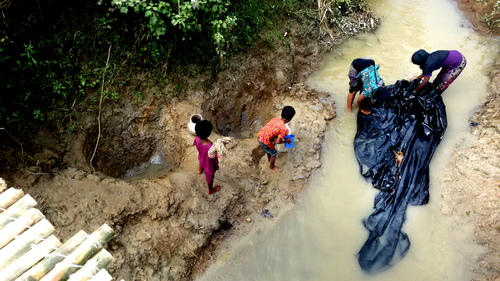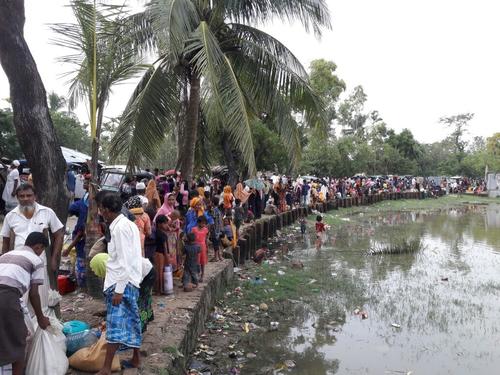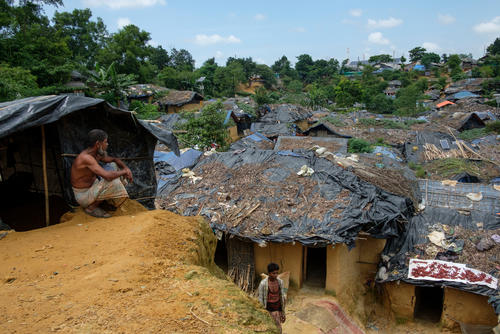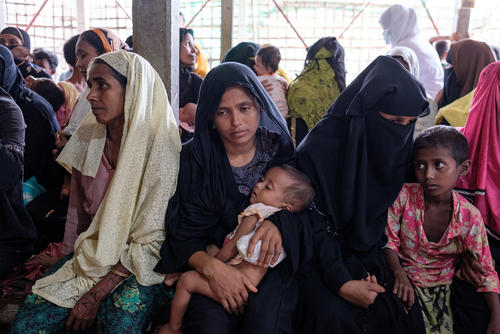In just over a month, more than half a million Rohingya refugees have arrived in Bangladesh following a wave of targeted violence in the neighbouring Rakhine State of Myanmar. Most of the newly arrived refugees have moved into makeshift settlements without adequate access to shelter, food, clean water, or latrines.
Paul Jawor, MSF water and sanitation expert, has just returned from a mission in southeast Bangladesh and tells us of the terrible conditions the refugees face and the solutions MSF is putting in place to provide them with sufficient clean water in Unchiparang, one of the settlements.
You’ve just returned from Bangladesh, what can you tell us of the situation there?
I have rarely seen so many people, hundreds of thousands, living in makeshift shelters, stranded in an area the size of a small European city, and with very little access to basic services. Assistance is being rolled out, but the needs of the refugees, especially access to drinking and clean water, are still extreme. In Unchiparang, one of the settlements where MSF is providing healthcare, access to water is horrendous. The 33,000 people living there only drink untreated surface water, which they collect from paddy fields, puddles, or hand-dug shallow wells. Many of the rare latrines available are already overflowing so people defecate in the open, further polluting the water.
From a geological perspective, Unchiparang has different features, some flat land with hills in the middle of the settlement. There’s a small river running through it, but only some of the refugees on one side of the hills have easy access to it. The ground is a very heavy impermeable clay and gets very muddy and wet when it rains. The aquifer is not deep and if you dig too much, you very soon tap into salty water due to the proximity of the sea.
Given the massive needs for clean water, what have MSF teams been able to do so far in Unchiparang during these first weeks?
Our priority, as always in such situations, was to ensure that clean and drinking water was available in the clinic we have set up in the settlement. We need to guarantee that the health structure is not a place where people can be contaminated with other diseases, notably diarrhoeal. The medical staff needs to be able to clean their hands and material; patients need to be able to take their drugs with a glass of clean water.
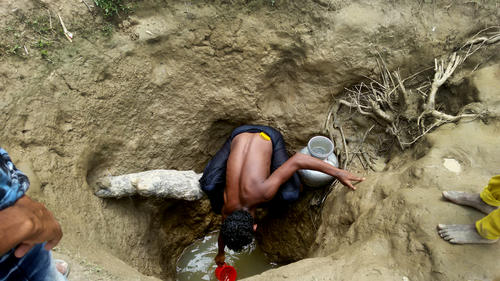
Then we have managed to make use of the main source of water, the river. Our teams have led a campaign to sensitise the population not to contaminate the river, and installed a long pipe leading to huge tanks that could deliver up to 30,000 litres of chlorinated and clean water per day. That’s really below accepted standards for such a large population, but we are adding more water capacity as we speak, especially for people who have settled far from the river.
In other locations, we will be using the traditional 'borehole' in the ground technique, but making it bigger and safer. We have started to dig such infiltration 'wells', up to two metres in diameter, and up to five metres deep, with the objective of having between 15 and 20 wells soon. They will have concrete platforms to avoid the dirt to get in, a little wall to stop flood water, and a lining inside to stop surface water from contaminating it. And, of course, the water will be chlorinated.
The main difficulty, with such a surface and such a population to cover, is to choose where to dig the boreholes. We have looked at our clinic’s medical records and identified locations where many of the diarrhoea cases are coming from with our health promotion teams. These most vulnerable and most at-risk families living near the future wells will also receive jerry cans, and a hygiene and disinfection kit. And it’s also key that the community is fully involved. MSF’s health promotion team will help and train them on how to chlorinate the water and maintain the water systems.
How do you see the situation evolving in the coming months for refugees in Uchiparang?
With the dry season coming, and more refugees arriving every day, access to water will remain a main concern in all settlements. In Unchiparang, the river running through the settlement will dry up, as every year, in two or three months, and the boreholes will provide less and less water per day.
It is important that MSF and other actors anticipate this and put in place water systems that can sustain the dry season. One of the things we plan to do is to build four 'swimming pools' in the Unchiparang settlement. We call them that not because people can swim in them, but to give an idea of their size. They are seven by seven metres and four metres deep, and can contain 200 cubic metres of water. They catch both rain and underground water. This is not a new or an unfamiliar idea. Tanks like this are present in every mosque and in some private houses in the area. And MSF has built such systems in other emergency interventions, for instance, in Myanmar after cyclone Nargis devastated the Irrawaddy Delta area in May 2008.



